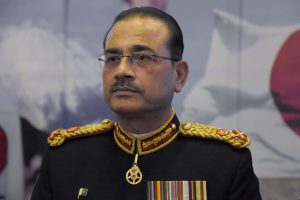The Pakistan Army’s recent announcement regarding accountability within its ranks is a significant development. The army’s robust system of accountability ensures that no individual, regardless of rank, is above the law or exempt from scrutiny, it said in a rare statement made during a top commanders’ conference.
This statement from the highest levels of the military serves multiple purposes. The timing and tone of this statement are particularly noteworthy, as Pakistan’s powerful army attempts to confront many challenges on various fronts.
The statement’s emphasis on the army’s “well-established and rigorous system of accountability” and the assertion that “there aren’t any exceptions or partiality” convey a strong message to those whose confidence in the institution’s system of accountability may have faded.
The message comes as the institution has put some of its retired officers on trial for violating discipline and the code of conduct. In particular, the former spy chief, Lt. Gen. Faiz Hameed (retd) faces a court martial trial for violating the Pakistan Army Act.
Additionally, the military’s decision to publicly address the issue of internal accountability suggests a desire to maintain the institution’s professionalism and integrity, even in the face of a polarized political landscape.
The emphasis on internal accountability could partially be a response to the impact of the country’s polarized political environment on the armed forces. It is important to note that the statement comes as concerns are rising that Pakistan Tehreek-e-Insaf (PTI) chief Imran Khan, who is accused of instigating the deadly attacks on military sites on May 9 of last year, may be charged in a military court.
The former prime minister has already petitioned the court to prevent his possible trial before a military court regarding the May 9 attacks. Seemingly, politicians have been warned by the military leadership through the Corps Commanders’ Conference declaration that any attempt to undermine the institution will face severe consequences.
By talking about the issue of internal discipline proactively, the military leadership aims to prevent any potential distractions and uphold its focus on its core responsibilities, including the fight against militancy.
There has been a surge in attacks by the Tehreek-e-Taliban Pakistan (TTP) in Khyber Pakhtunkhwa and a resurgence of Baloch extremist organizations in Baluchistan. In August 2024, there were 59 terrorist attacks in Pakistan resulting in the death of 84 people, compared to 38 attacks the previous month. There have been 29 attacks in Khyber Pakhtunkhwa, 28 in Balochistan, and two in Punjab. With the military busy fighting on several fronts, its leadership is unlikely to put up with any politicization of issues or diverting focus from the situation at hand as it would make it harder for the forces to concentrate on these urgent security matters.
Moreover, the timing of the statement, ahead of Pakistan’s National Defense Day, is also significant. During this annual event, the military typically showcases its capabilities and resolve to defend the country. This year’s commemoration may see the army leadership reiterating its recent announcements emphasizing the need for unity and accountability and a strong bond between the military and the people.
Furthermore, the mention of “Freedom Movement” at the Corps Commanders’ Conference to refer to those confronting India’s control of Jammu and Kashmir suggests that Pakistan is unlikely to accept New Delhi’s increased jurisdiction over the contested region. This indicates that the dispute over Kashmir will continue to be a point of contention between the two countries, especially as India prepares to hold elections in its part of the region soon.
Overall, the Pakistan Army’s public announcement of ruthless accountability within its ranks is an important development. The fact that this discussion took place at the highest level of the military’s command structure underscores the unity and consensus within the institution on the issue of maintaining discipline and accountability, among serving and retired officers.
Among other things, it demonstrates that the military feels the need to maintain its professionalism in the face of challenging times. However, only time will tell if the military establishment’s current exposure to Pakistan’s political landscape could prevent it from coming up in discussions and debates.

































